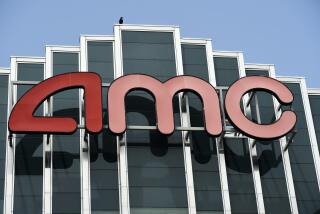Geffen, Others May Face Big Taxes if MCA Sold : Entertainment: Large stockholders of the American firm want a Matsushita buyout deal that would minimize what they owe Uncle Sam.
- Share via
Music mogul David Geffen, who rejected an all-cash bid for his company and sold it at a lower price to MCA Inc. in March in a deal that enabled him to avoid a huge tax bill, may have a tough time avoiding taxes if Matsushita Industrial Electric Co. consummates an offer for MCA.
Geffen’s predicament--and that of other large MCA shareholders--has touched off an intriguing debate among accountants and investment bankers about how a Matsushita buyout of MCA might be structured to avoid an immediate tax burden on large MCA shareholders, some of whom might realize profits of hundreds of millions of dollars.
MCA--whose holdings include Universal Studios, record companies, a film library, theme parks and a New York-area TV station--saw its stock fall 75 cents a share Thursday and another $1.75 the next day to close the week at $61 a share. This was after a spokesman for Japan’s largest consumer electronics company said Matsushita officials hadn’t begun talks with MCA but will travel to the United States to begin them soon.
Experts say sparing MCA shareholders the prospects of immediately paying taxes on any stock profit would be complicated by Matsushita’s status: As a foreign company whose shares do not trade directly in the United States, it cannot easily issue its stock to MCA shareholders as a way of avoiding an immediately taxable transaction.
“It’s not clear that you could get a tax-free transaction with Matsushita,” said Ilan Kaufthal, managing director of the New York investment banking firm Wertheim Schroder & Co. He said he didn’t know of an instance of a major foreign company attempting such a deal.
Of course, with speculation that Matsushita might offer as much as $90 a share for MCA, only weeks after the stock was trading around $35, some shareholders say they aren’t worried about having to give as much as one-third of their profits to the Internal Revenue Service.
“I’ll take the cash” from Matsushita, said GRP Records President Larry Rosen, who received 759,140 shares of MCA stock when he sold his record company to the entertainment giant in February.
Investors in a company being purchased by another firm sometime prefer stock in lieu of cash to avoid paying taxes immediately on profits from the sale. Taking stock gives investors the flexibility to realize a capital gain later, when they are in a lower tax bracket or have losses to offset profits.
Geffen said tax considerations were the main reason that he spurned a $700-million cash offer from the British media conglomerate Thorn EMI and sold his Geffen Record company in March for MCA stock then worth about $545 million. Geffen had called MCA stock “undervalued” when it rose $3 a share a few weeks after the sale.
In recent days, Geffen, who estimates MCA’s breakup value at more than $100 a share, has said that he will “support any decision” that MCA officials make regarding a sale of the company and that he has no intentions of independently selling his MCA stock.
Yet, in his peculiar position as holder of a specially issued MCA stock, Geffen is said to be extremely concerned about the impact an agreement might have on his ability to cash out at maximum value to the Japanese giant Matsushita.
“He wants to be a billionaire,” one MCA source said.
Geffen holds 621,684 shares of MCA common stock and an additional 921,914 shares of MCA participating convertible preferred stock, which he received when he sold his record company to the entertainment giant. Each of Geffen’s preferred shares can be converted into 10 shares of MCA common stock. At Friday’s closing price, Geffen’s holdings would be worth about $598 million. But under a four-year agreement with MCA, Geffen cannot sell his stock at one time or to a single buyer unless MCA is sold.
Depending on the price paid for MCA, however, Geffen may not be better off financially.
Factoring in the taxes that would become due in any cash purchase of MCA, Kaufthal of the Wertheim Schroder & Co. investment firm calculates that MCA would have to be sold for at least $71 a share for Geffen to improve on the paper profit he realized in March when he sold his company to MCA.
Phil Holthouse, a partner at the Los Angeles accounting firm Parks, Palmer, Turner & Yemenidjian, said one way to achieve a tax-free transaction might be for Matsushita to acquire MCA using its American depositary receipts--which are traded on the New York Stock Exchange. ADRs are special securities that allow American investors to purchase equity in a foreign company whose stock does not trade on U.S. exchanges.
In a 1965 decision, the IRS held that “a holder of an American depositary receipt will be treated . . . as if he held the underlying shares of (the company’s) stock directly” for purposes of claiming a foreign tax credit and certain other benefits. And two years ago, in a private letter ruling, the IRS indicated that the transfer of a foreign company’s stock for the assets of a U.S. corporation may not result in an immediately taxable gain.
Holthouse believes that the IRS rulings “mean you probably could do a tax-free reorganization using those (ADRs), if it’s structured correctly.”
“Apparently both (MCA Chairman Lew R.) Wasserman and Geffen will have a pretty low basis in their stock so they would have a tremendous” tax obligation. (The tax basis of an investment is, effectively, its purchase price.)
“But if it ends up being a taxable purchase,” Holthouse said, “it will certainly help solve the federal budget deficit.”
More to Read
The biggest entertainment stories
Get our big stories about Hollywood, film, television, music, arts, culture and more right in your inbox as soon as they publish.
You may occasionally receive promotional content from the Los Angeles Times.










